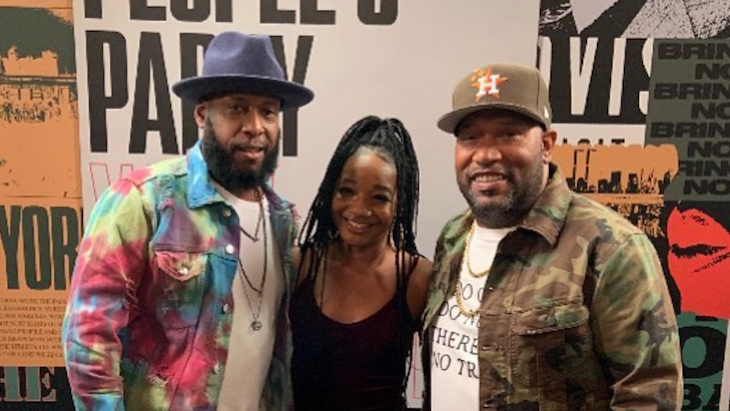
Bun B Tells Talib Kweli Why T.R.O.Y. Is The Biggest Hip-Hop Song Of All Time (Video)
Back in 2011, Bun B accepted a position at Rice University to co-teach a class about Religion and Hip-Hop Culture. Since then, the UGK co-founder has imparted his knowledge in these areas to hundreds of Texas. Beyond academia, Bun regularly reflects on his experiences as an MC, a father, and one of the more influential Rap artists of the last 20-plus years.
For the inaugural episode of Talib Kweli’s People’s Party show (with Jasmine Leigh), the “Country Cousins” collaborators from a dozen years ago discuss how academia has informed Bun’s understanding of Hip-Hop’s evolution and its power.
Bun B & His Wife Give A Detailed Account Of The Shootout In Their Home (Video)
“We have to put everything in its own historical perspective. We have to put the Black Experience in its historical perspective, so before we get to Hip-Hop we have to get through a lot of music and culture,” Bun says near the 35:00-mark. “So we start at Negro Spirituals and work our way all the way up. And from that perspective, they can see lifestyle/influences, lifestyle/influences, lifestyle/influences, lifestyle/influences: We’re going through Blues, we’re going through Jazz, we’re going through Soul music, lifestyle/influences all these different things.” Much of UGK and Bun’s solo music has drawn on those older genres of Black music and fused it with what was happening in the streets of Port Arthur, Texas.
Like social media today, music—and Black music in particular—has been a travel guide that connects the world. However, at a time when some fabricate an identity on social platforms, Hip-Hop held many accountable to their actual realities.
Stream Bun B & Statik Selektah’s Star-Studded TrillStatik Album
“We see now, people in New York live like this,” he later continued, moving to Hip-Hop. As a B-Boy, he looks back at what records and music videos meant to him during his coming of age. “[At one time I had] never been to New York; I don’t know nobody from New York. [It] sounds like they’re going through what I’m going through. Then you hit people in Chicago, people in Florida, people in L.A.” He suggests that some experiences are universal. “And then y’all hear people from Texas, and then Nelly starts talking about St. Louis, and then you start getting an idea of this world you live in. When the Geto Boys made ‘The World Is A Ghetto,’ everybody gets it because at that point we have info about all these other cities.” Bun adds that a song like Ghostface Killah’s accounts of poverty in 1996’s “All That I Got Is You” were resonant far beyond Staten Island, New York City, or the East Coast region. The vulnerabilities were universal, which made G.F.K. a trusted source for so many. “So for somebody who was so flamboyant and somebody who seemed to have everything figured out—such a great writer [who is] part of this amazing collective, you hear his life—you [related]. ‘Man, I remember being down bad like that. My moms left my dad, and we had to go to my auntie’s house.’ You get it. Hip-Hop can be as personal as it wants to be, and sometimes as it needs to be. It’s these shared experiences that bring us all together.”
“That’s why the biggest Hip-Hop song of all-time is ‘They Reminisce Over You.’” He elaborates on Pete Rock & C.L. Smooth’s 1992 single. “Because everybody finds themselves in that unique position of, ‘Man I love my boy, I love my girl. I hate this how this [that they are] gone, but I don’t always wanna cry about it; I want to remember the good things about it,'” says Bun. C.L. Smooth rapped about the loss of Trouble T-Roy of Heavy D & The Boyz, who had died the year before Pete and C.L. released the song.
Pete Rock Recreates “They Reminisce Over You” Behind The Turntables (Video)
“When you lose friends, and you lose family – just like at the beginning of the song – the first two verse are really just reflecting on family, and what life is about and that’s what you do when you lose people, and you really understand what death is about. You start to really deal with your own mortality, and you start putting your life in perspective. It’s one of the best-written songs. Ever, period.” Talib, who worked with both UGK and Pete Rock on 2007’s Eardrum, agrees with the statement.
Bun continues, “The emotion hits every time. Every time you hear those horns, you go right back to that same place.” Kweli adds, “That’s my favorite Hip-Hop sample of all time. [Pete Rock] really nailed it with that, but C.L. Smooth just [wrote an amazing song]. Yeah man, that’s a great record.” Bun reveals that he recently got to speak to C.L. for the first time.
Stream A Collection Of Previously Unreleased Pete Rock Beats From The 1990s (Audio)
Elsewhere in the interview, Bun discusses his 2019 collaborative album with Statik Selektah, Trill Statik (which Talib Kweli appears on). He recalls some interesting creative mantras from the late P*mp C surrounding JAY-Z and appearing on “Big P*mpin’.” Bun praises the influence of Houston Rap O.G. K-Rino and some of UGK’s affiliates. Additionally, both men recall some lesser-known encounters with Biggie Smalls during the 1990s.
Additional Reporting by Jake Paine.